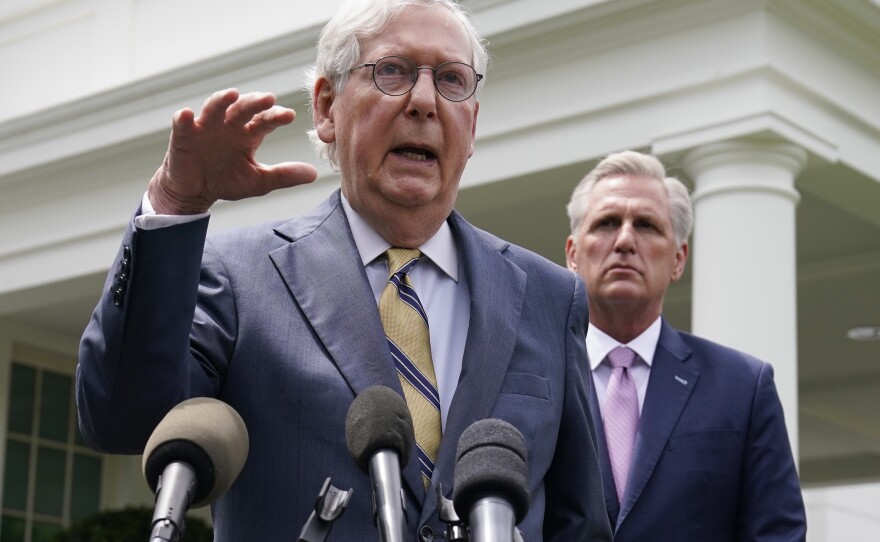President Biden continues to get good marks for his handling of the most pressing issue of the day — the coronavirus pandemic. He also remains on average above 50% for his handling of the economy, which is closely tied to COVID-19.
But as things start to open up more and get back to normal — with the Centers for Disease Control and Prevention's new mask guidance for fully vaccinated people leading the way — there are crises or potential crises looming on the horizon.
For a couple of months, it's been clear that Americans have less confidence in the president's handling of immigration, for example. There has been a surge of migrants, including unaccompanied minors, at the southern U.S. border, and the Biden administration has struggled to respond.
This week, some new things got added to Biden's plate, including inflation, a run on gas and renewed fighting in the Middle East between Israel and Palestinians. They threaten to derail an agenda that has so far, for the most part, stayed on the tracks.
Asked about it Friday at the White House, press secretary Jen Psaki said, "This is exactly what he was elected to do, is to lead the country during a time of multiple crises" and that he put together a team "to be prepared in these moments."
A full plate, but empty pump
Inflation was the economic word of the week. Consumer prices went higher than expected, which sent some jitters through Wall Street.
Gas prices are up, and renewed travel this summer looks likely to keep them relatively high. Long gas lines across the East Coast, due to a ransomware attack on a major U.S. pipeline, caused a degree of panic at the pump this week.
Colonial Pipeline has brought its entire system back online, and Biden said he expects to see improvement this weekend "and into early next week."
"Don't panic, No. 1," he urged Thursday. "I know seeing lines at the pumps or gas stations with no gas can be extremely stressful, but this is a temporary situation."
Do not fill plastic bags with gasoline.
— US Consumer Product Safety Commission (@USCPSC) May 12, 2021
People clearly panicked, however. There was video of a fight that broke out between a man and a woman over their spots in line at a North Carolina gas station. A couple was caught in Alabama filling multiple gas cans and putting them in the back of their car. A South Carolina woman, who was hoarding gas, tried to evade police, wound up crashing her car and caught on fire.
Add onto all of that unease smaller-than-expected job growth at the beginning of the month and burgeoning Middle East fighting.
Saying he wanted to bring "perspective" on the 266,000 added jobs, Biden noted that the "economy is moving in the right direction, but it's clear we have a long way to go."
He pointed out that the economy has added 1.5 million new jobs since he took office, "the most number of jobs created in the first three months of any presidency in our history."
Of course, there was a very deep hole created by the pandemic and the policy response to it. There are still more than 8 million fewer workers on payrolls than there were before the pandemic.
A stronger GOP negotiating hand?
Critics are also ringing alarms about the amount of money infused into the economy by the Biden COVID rescue plan.
"There's so much money out there in the economy that the demand is high, and it's outpacing supply, and it's starting to push prices up," Sen. John Thune, R-S.D., said this week before the inflation numbers were out. "We need to be a little more cautious and restrained."
Republicans certainly feel their negotiating hand is strengthened, compared to a couple weeks ago, when it comes to an infrastructure deal.
Biden has put forward an approximately $2 trillion plan, something that is a nonstarter with Republicans. They see too many extraneous items in it, like electric vehicle charging stations and other climate-related measures.
Biden argues those things are necessary to bridge the economy to where it should go in the future and that these investments are not unlike when railroad tracks and the interstate highway system were first proposed.
Nevertheless, Biden seems eager for a deal with Republicans on infrastructure. He held two meetings this week, trying to negotiate a bipartisan agreement.
Republican leaders want a deal on what they see as "traditional infrastructure" — repairs to roads and bridges, mostly. They have floated that they are willing to go as high as investing $800 billion, less than half of what Biden wants, but up $200 billion from what GOP senators had initially offered.
Of course, the two sides still don't agree on how to pay for it. Ironically, considering this week's gas line panic and increasing gas prices, Senate Republican Leader Mitch McConnell would like to raise the gas tax.
The gas tax, which is what largely funds federal infrastructure measures in the country, has not been raised since 1993 and is not indexed to inflation.

But will that matter to Americans when they're paying more at the pump when traveling for Memorial Day Weekend? The Biden administration has already crossed that off the list as a potential source of revenue for this plan.
"No, that's not part of the conversation about this infrastructure bill," Transportation Secretary Pete Buttigieg said on CNN Monday.
Democrats are largely against what's known as user fees, because they are seen as regressive. In other words, they take a larger toll, so to speak, on those who make less.
Temporary blip or tip of the iceberg?
Much of the thorny new crop of issues is out of Biden's control, and the White House sees inflation as a temporary COVID-related blip — or hopes it will be.
"The expectation from economists, both inside and outside of the government, is that the impacts of our proposed investments are transitory, are temporary, and that the benefits far outweigh the risks," press secretary Psaki said Thursday.
But Republicans have seized on inflation and gas prices and are already attempting to compare Biden to former President Jimmy Carter, who faced unprecedented inflation and an oil shortage, which resulted in a gas crisis.
"I see that everybody is comparing Joe Biden to Jimmy Carter. It would seem to me that is very unfair to Jimmy Carter," said former President Donald Trump, who is still, at this point, the leading contender to the Republican presidential nominee in 2024. "Jimmy mishandled crisis after crisis, but Biden has CREATED crisis after crisis."
Let's be clear: This is not close to the 1970s yet. Inflation rose 4.2% this week, not 14%.
But that doesn't mean there isn't a potential political problem out there for Biden.
The president has shown a desire to stay the course on his agenda, but every president has to deal with unscripted crises.
Biden's ability to handle them is about to be tested.
Copyright 2023 NPR. To see more, visit https://www.npr.org. 9(MDAzMjM2NDYzMDEyMzc1Njk5NjAxNzY3OQ001))







